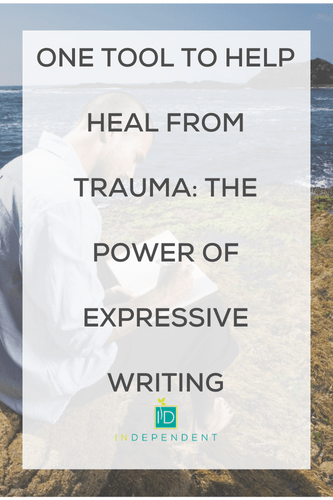The thoughts we think to ourselves and the words we write down hold just as much weight as the words we speak out loud. One of the ways writing can help is in coping with trauma. Trauma comes in all different forms, shapes, and sizes, and can affect our lives in different ways. How you heal from trauma can be different from person to person as well. It all depends on what works best for you. Remember, one size does not fit all. Writing may not work for everyone, but you won’t know if you don’t try. It’s good to be open to different types of healing modalities. Expressive writing or journaling is just one of many tools that can help you heal from trauma.

WHAT IS EXPRESSIVE WRITING?
Expressive writing, according to Positive Psychology is writing from your heart and mind with disregard to punctuation and spelling. It is writing about the emotion associated with a certain event. When you write down the emotions associated with a traumatic experience, you are then able to detach from the emotion, making it easier for you to talk about and process the event. Therefore, writing helps you shift your perception of the traumatic event in order to help you heal and overcome the control it has over you. The first step is being aware of yourself and being honest that there is something going on within you that you want to confront.
THE IMPACT OF UNRESOLVED EMOTIONS ON YOUR HEALTH
Letting unresolved emotions fester and build up inside can have a negative effect on your health. According to psychoanalyst and emotions educator Hilary Hendel in her Time Magazine article, holding in emotional stress can contribute to symptoms such as heart disease, intestinal problems, headaches, insomnia, autoimmune diseases, and PTSD. Not confronting certain experiences can have a negative impact on your relationships as well.
Try to look at it like this: if you hear a strange noise coming from your car or if it feels off, you’re going to take it to a shop to get it looked at as soon as possible, right? If not, it can potentially lead to more serious problems, causing you to pay more money to fix it. You invest money in preventative care for your vehicle, i.e. oil changes, tire alignments, and so on. Expressive writing can be used as preventative care for yourself.
THE IMPACT OF TRAUMA ON YOUR BRAIN
Veteran and founder of Veterans Writing Project (VWP) Ron Capps explains what happens to your brain during and after a traumatic experience. Your brain, particularly the amygdala, remains in “survival” mode, or fight or flight mode (reacting without thinking), just like a deer being chased by a lion. The deer is in survival mode, literally running to stay alive. Once the lion gives up, unable to catch the deer, it walks away and the deer goes back to grazing like nothing happened with no memory. Unfortunately, humans tend to remember things whether they want to or not, especially when it’s something that has had a big impact on their life. The one thing to remember is that humans can choose which memories to hold onto and which to let go of. You just have to be willing to do the work.
For most people, the thought of acknowledging emotions and admitting that there’s something wrong with us is difficult. Why? This is because of societal stigmas that come along with expressing emotions, which can bring up feelings of guilt and shame. Also, seeking help for emotional stress is often seen as a sign of weakness. That is what sets journaling apart. This is between you and your journal – you don’t have to share it with anyone unless, of course, you choose to.
SCIENTIFIC STUDIES ABOUT EXPRESSIVE WRITING AND ITS POSITIVE EFFECTS

In a case study done by Andrea N. Niles and other psychologists, 116 young adult participants were instructed to write for twenty minutes a day on four occasions about their deepest thoughts and feelings regarding their most stressful/traumatic event in the past five years (expressive writing). Niles and her team followed up with the participants after three months and found that the people who were consistent with expressive writing showed signs indicating a significant reduction in anxiety.
The Cambridge Press did an article as well regarding the benefits of journaling to include improved IBS, immune system function, and mood as well as a reduction in stress, anxiety, depressive symptoms, and more. Knowing these benefits, expressive writing can be your preventative tool, one of many that can help you on your journey to emotional freedom, an improved lifestyle, and overall better mental health.
HOW TO START EXPRESSIVE WRITING
I know that journaling can be a bit odd at first because it is something that might be outside of your comfort zone. I have attached some prompts to help get you started. Remember this is not for everyone and that’s ok. But if there is a chance that it might help, there’s no harm in trying it. I only ask that you approach this with an open mindset. When things get overwhelming, stop, close your eyes, take a couple of deep breaths, and decide to continue or step away. Also, this process can take time, so be compassionate with yourself when you don’t see the results you are seeking right away.
General Instructions for Expressive Writing:
- Write for 15-20 minutes.
- Write continuously without worrying about punctuation, grammar, or spelling. If you think you have run out of things to write, repeat anything you already wrote. The goal is to keep writing and not stop until time is up.
- Write about your emotions related to a personal event.
- Write only for yourself.
- Optional next step: After a few days, try writing from the perspective of other people involved in the situation.

Here are some journal prompts to get you started:
- What external experience triggers a negative reaction within me?
- When I think about this specific experience, what emotions surface?
- Are there physical symptoms that come up?
- What feelings do I try to avoid feeling? Why do I think I avoid them?
- Why do I react negatively to this experience?
- How is it disrupting my life?
- In what ways do I want to heal from this?
- How can I create the support I need to heal?


ABOUT CHRISTINA
Christina Tello is a journaling advocate, veteran spouse, mom of three, and the creator of Unleash Your Truth. In her pursuit of self-healing, she discovered journaling. When she realized the power of writing and how it shifted her relationship with herself and others, she began to share this knowledge with others. She now holds online and in-person workshops to teach others how to use journaling as a tool for healing. In her free time, she enjoys reading, dance, and watching movies with her family.

